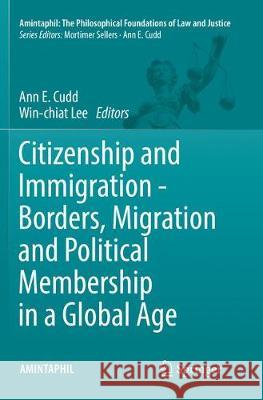Citizenship and Immigration - Borders, Migration and Political Membership in a Global Age » książka
topmenu
Citizenship and Immigration - Borders, Migration and Political Membership in a Global Age
ISBN-13: 9783319813691 / Angielski / Miękka / 2018 / 239 str.
Kategorie BISAC:
Wydawca:
Springer
Seria wydawnicza:
Język:
Angielski
ISBN-13:
9783319813691
Rok wydania:
2018
Wydanie:
Softcover Repri
Ilość stron:
239
Waga:
0.36 kg
Wymiary:
23.39 x 15.6 x 1.35
Oprawa:
Miękka
Wolumenów:
01
Dodatkowe informacje:
Wydanie ilustrowane











